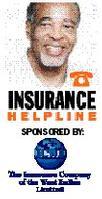
QUESTION: I own three trucks. Two are insured comprehensively. The other has a third party policy.
Insurers say that they will stop providing comprehensive coverage at renewal. This is due to the age of the vehicles. I am very worried. The trucks are my family's only source of income.
The actions of insurers seem so unfair. They collect premiums when the trucks are new and refuse to cover them when they get old. Can you help me obtain full coverage for my trucks?
R.B., St. Ann
ANSWER: A former 'professor of journalism' at the 'University of Harbour Street' once told me: Ask the wrong question and you'll get an incorrect answer. For many years I accepted those words as true. I now realise that like all rules this one has exceptions.
If I were to reply to your query the answer would be wrong for your situation. My aim is,
therefore, to help you to view this setback in a different way. What you call full insurance will not solve the problem.
CAN TRUCKERS SURVIVE WITHOUT COLLISION INSURANCE?
Your family can survive with only third party insurance on the trucks. Very few vehicles on our roads are insured against collision-damage. This type of coverage is the exception rather than the rule.
Almost all of the nearly 240,000 vehicles 'certified fit' to operate between 2002/2003 had third party policies. This includes the over 400 very pricey buses that JUTC owns. That company like other large, medium and small fleet owners buys only third party insurance.
This is because the law requires it. [Collision-damage coverage plus third party equal comprehensive insurance].
Most buyers self-insure their collision-damage risks. Money that would have otherwise been spent to pay insurers is saved.
RISK MANAGEMENT IS KEY TO SURVIVAL
The survival of your business depends on how well you manage risks. While insurance can be a part of the risk-handling process, it is not always essential.
Key elements of the process include: (i) identifying risks (2) measuring their impact and (3) taking steps to control them.
Control measures include avoidance, mitigation and transfer [e.g., insurance]. How can this theory be used to help your business?
Let us examine the first item. Drivers cause most of the road accidents in Jamaica. All the statistics confirm this.
The police listed 19 causes for the 12,585 accidents during 2003. The majority, or 62.7 per cent, were driver-related.
Speeding, improper overtaking, turning without due care and tailgating were among the causes cited.
Bad roads and defective vehicles caused less than one per cent of the mishaps, and 37.2 per cent of the mishaps were due to unknown causes. These numbers apply to all types of vehicles.
The basic message is clear. The hiring of drivers who are prone to accidents can be an important source of risk in your type of business.
Drivers should not be chosen because they have permits to operate vehicles. Other important things are also involved.
Male drivers in the 21-35 year group for instance, cause the most road accidents. It would, therefore, be wise to avoid persons in this category.
OTHER FACTORS TO LOOK AT
Other factors to examine include traffic violations, accident history, and the use of alcohol and illegal substances.
You may also need to take a look at other areas of your business. Are the trucks being properly and regularly serviced? Are pre-trip inspections of the brakes, lighting, tyres and wheels and loads carried out? Have you studied your accident history to see if there is a pattern?
Our official statistics do not give a breakdown of accidents by vehicle type. However, research from other countries suggests that paying attention to those four items can lead to fewer accidents.
Collision-damage insurance is nice to have. It is a 'safety blanket' to protect your trucks in the event that certain specific things happen.
I hope that I have given
you a few ideas to ponder if full coverage is unavailable or the cost is too high.
Contact an insurance broker to help you find out. Whatever the outcome, I believe that these techniques can help you to manage your business with or
without collision-damage insurance and secure your family's income over the long haul.
Cedric E. Stephens provides independent information and advice about the management of risks and insurance. If you need free information or counsel to help you solve a problem write to the financial editor or contact Mr. Stephens directly at aegis@cwjamaica.com












